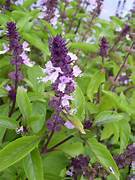DEPARTMENT OF BOTANY
MEDICINAL PLANTS
Ocimum basilicum L.
Ocimum basilicum, commonly known as basil, The Lamiaceae family, also known as the mint or sage family, includes many aromatic plants with culinary and medicinal uses. Ocimum basilicum is a member of this family, known for its fragrant leaves and flowers.
________________________________________
Botanical Details
• Scientific Name: Ocimum basilicum
• Family: Lamiaceae
• Genus: Ocimum
• Species: basilicum
Synonyms
• Synonyms:
o Ocimum citriodorum (sometimes referring to lemon basil)
o Ocimum gratissimum (closely related species, often confused with Ocimum basilicum)
Common Names
• English: Basil
• Malayalam: Rama thulasi
Uses of Ocimum basilicum
Ocimum basilicum is widely used for both culinary and medicinal purposes, with a rich history in various traditional healing systems.
Culinary Uses:
• Herb: Ocimum basilicum is primarily known as basil, a popular herb used in various cuisines worldwide, especially in Italian, Mediterranean, and Southeast Asian dishes.
o It is used fresh or dried in dishes such as pasta, pizza, salads, and pesto.
o Basil is often paired with tomatoes, garlic, and olive oil, making it a staple in Italian cuisine.
o The leaves are also used as a garnish or flavoring in soups, stews, and curries.
o Basil oil is commonly used as a flavoring or for finishing dishes.
Medicinal Uses:
Ocimum basilicum has a variety of medicinal properties, and is often used in Ayurvedic, Unani, and Traditional Chinese Medicine (TCM).
• Anti-inflammatory: Basil has potent anti-inflammatory effects, which can help alleviate conditions like arthritis, muscle pain, and swelling.
• Antioxidant Properties: The leaves are rich in antioxidants, which can help reduce oxidative stress and may protect cells from damage.
• Digestive Aid: Basil is commonly used to improve digestion and relieve stomach issues such as bloating, indigestion, and nausea. It is also used as a mild laxative.
• Respiratory Health: The herb is often used in tinctures or teas to relieve symptoms of cough, cold, and asthma due to its soothing properties.
• Antibacterial and Antifungal: Ocimum basilicum has been shown to have mild antibacterial and antifungal properties, making it effective for treating minor infections.
• Stress Relief: Basil is considered an adaptogen, meaning it helps the body adapt to stress, reduce anxiety, and promote relaxation.
• Skin Health: The essential oil of basil has been used in skin care for its ability to cleanse and rejuvenate the skin, especially in treating acne and minor skin irritations.
Aromatic and Other Uses:
• Basil Oil: Essential oil extracted from basil leaves is used in aromatherapy to alleviate stress and promote relaxation.
• Insect Repellent: The strong aroma of basil is effective as a natural insect repellent, particularly against mosquitoes.
• Cosmetic Use: Basil is used in cosmetic formulations for its purifying, toning, and anti-aging effects on the skin.
